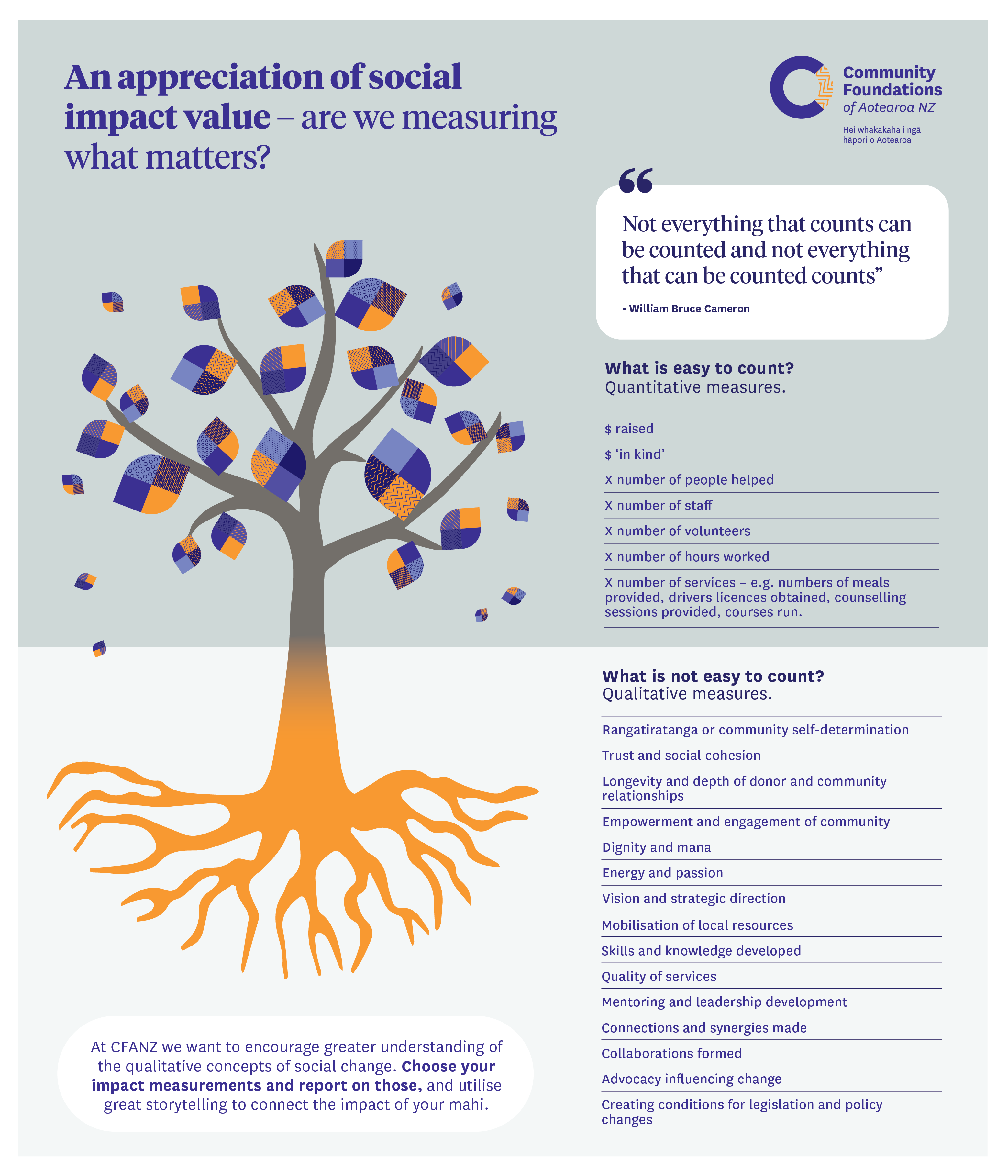Measuring what matters

Eleanor Cater
Philanthropy and Membership Services Director
23 April 2024
“Not everything that counts can be counted and not everything that can be counted counts” ~ William Bruce Cameron.
Recently I attended a community sector webinar where a community leader expressed frustration at not being able to afford an ‘impact report’. The resulting discussion exposed the pressure community organisations are feeling to prove their impact through what can be costly consultant reports.
We sit in a really interesting space in the community foundations world, in that we have one foot in the charity sector and the other in the funding sector, straddling the fence between communities raising funds and funders who are deciding who and how they fund. It’s an interesting space to be, as we see the debates happening on both sides of the fence.
And, while the need for ‘impact reports’ and ‘proving impact’ is a much talked about concept in the community sector, we don’t see the same level of enthusiasm in the funding or philanthropy space.
Our experience (backed up by research) tells us that philanthropists are driven to give for many complex reasons, and most often to causes that touch their heart and soul. Funders want to invest in quality services, care and trust, change and changemakers, the mobilization of local energy, the leadership it takes to convene, connect and to really shift the dial, rangatiratanga and self-determination of communities, social cohesion and the vision and strategies of local community organisations.
That’s not to say that there aren’t philanthropists and funders who care about results and measuring impact (there certainly are). However, most also appreciate that social impact work is complex, deeply intersectional, intangible and non-linear and that communities must define what impact means to them. Measuring qualitative outcomes simply with quantitative measures can be meaningless… somehow, it sucks the heart out of vibrant, living, changemaking community mahi. It flattens it.

At CFANZ we think that what we measure, really does matter. It informs what we do and who we become, so if we are measuring the wrong things, we may end up focusing on the wrong things, or the things that aren’t impactful at all (and the irony isn’t lost on us there!)
To this end, we thought that this simple infographic might help community organisations struggling with the concept of ‘impact measurement’.
What would you add to the list of outcomes (leading to impact) from our purpose-fueled sector?
Email us your thoughts: admin@communityfoundations.org.nz
Download a printable version of this infographic here:
CFANZ Measuring Impact Infographic
For those interested in the wider concepts of impact measurement - and some nerdy readings - check out:
- Stanford’s Philanthropy and Civil Society Blueprint, in particular the writings of Horvath (pp 26-30).
- Incorporating equity into measurement - The Bridgespan Group
- How philanthropic collaboratives measure, evaluate and learn - The Bridgespan Group
- NPC - theory of change and impact evaluation
Thank you also to Barry Knight and the Global Fund for Community Foundations for your leadership in this space.
Date Posted: 23 Apr 2024
Recent Posts
It’s easy to give and get (your tax) back
16 Jan 2026
All around the world, tax rebates are used to encourage people to donate more to charities and causes. They are a powerful way to inspire generosity and shows that private donations are truly valued in helping to build strong, vibrant communities.
Read moreThe overhead myth: are we strangling the charities we love?
29 Jan 2026
Community foundations work with hundreds of Kiwis who want to create positive change in their communities. We love the passion with which local people care about the work of community-led change, and in many cases the long-term commitment to enabling that change. However, there is a statement that we hear all too often: "I'm happy to pay for the work of the charity, but not the salary and overhead costs" ....
Read moreGiving Tuesday – beyond the spend fest
25 Nov 2025
Giving Tuesday is today, December 2nd, and over the years it has become a global movement, expanding to over 80 countries. While New Zealand is a long way from the USA we also find ourselves with many of the pressures to spend, spend, spend in the lead up to the festive season...
Read more